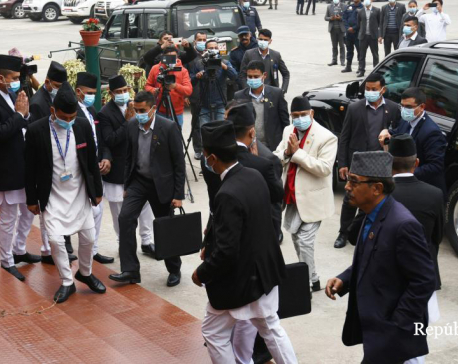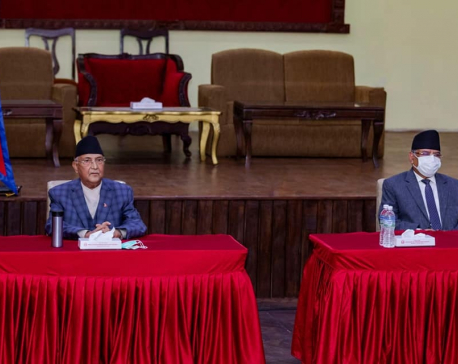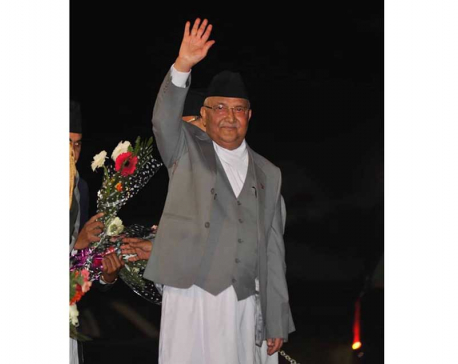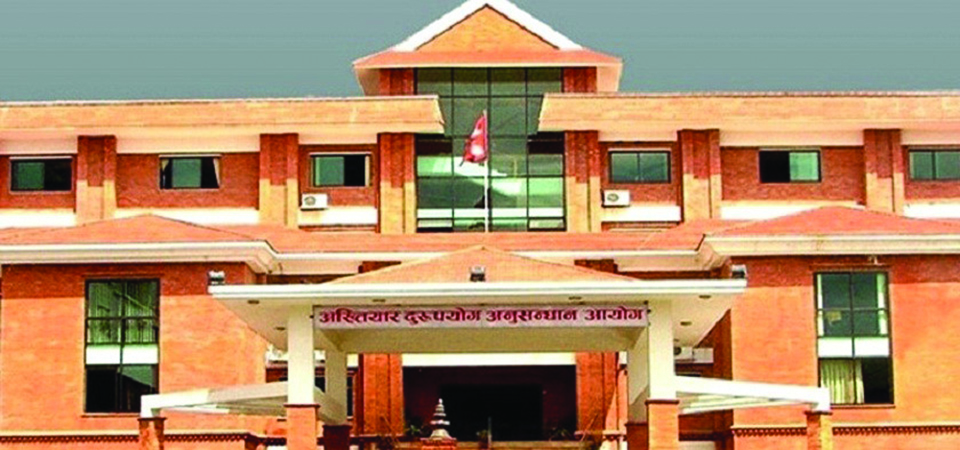
OR
Nepal's coronavirus genome is similar to that found in India: Study
Published On: November 30, 2020 03:30 PM NPT By: SHREE RAM SUBEDI

KATHMANDU, Nov 30: Prime Minister KP Sharma Oli, on May 19, spoke in the parliament about the relative strength of coronaviruses coming from different parts of the world. "The virus coming from Wuhan, Italy and Dubai appeared weak. But the one coming from India appears lethal," he had said. PM Oli made the remarks after the country saw a steep spike in the number of corona cases with the influx of migrant laborers from India. The Indian media went nuts over the PM’s statement. The PM's remark was based on personnel observations, not on scientific basis.
A study, though failed to assess the comparative virulence and lethality of the virus from India, has shown that the majority of the virus sequence recorded in Nepal are similar to those recorded in India. "Of the 15 virus sequences unveiled in Nepal, two-thirds similar to that found in India," Dr Pradip Gyawali, member secretary of the Nepal Health Research Council (NHRC), said.
Nearly three months after the PM's remark in the parliament, and seven months into the outbreak of COVID-19, the NHRC investigated the genes of the virus to ascertain its makeup, and possible mutations on their journey to Nepal. The baseline study, covering a total 15 COVID-19 samples, aimed to record the changes in their genetic identity in Nepal beginning from its outbreak in January.
A private lab, Intrepid Nepal Pvt. Ltd. (INPL), was entrusted to unveil the genetic sequence of the virus through 'Next Generation Sequencing (NGS)' technology, which reads the entire genome in a short period of time. Comparing sequencing results over time can help scientists understand the virus’ mutation. With the completion of the genetic sequence, further validation was made by a World Health Organization lab in Hong Kong.
As a part of the study, samples of SARS-CoV-2 were collected from National Public Laboratory,Teku, Nepal Korea Maitri Hospital, Thimi and Kathmandu University, Dhulikhel, representing 10 different districts of various ecological zones, and covering a period from June 26 to August 10. The results of findings were correlated with the help of bioinformatics tools and various online platforms, including NCBI and GISAID.
Experts believe that the mutations of the virus is one of the reasons for the surge in corona cases and patients with symptoms in Nepal. The study has confirmed changes in proteins--both in its structural and non-structural format. "In structural protein, changes were recorded in spike and Nucleocapsid protein and these proteins let viruses enter human cell," reads a summary of the study finding, available to Republica.
Alterations in genes were recorded in non-structural proteins including nsp2, nssp 3, aasp 12, which are largely RNA dependent and RNA Polymerase(RDRP). These non-structural proteins play a pivotal role in infections and pathogens.
In its major findings, the report said, "The genetic composition of the virus in Nepal is similar to India, Bangladesh, Saudi Arabia, Europe and America. As there are differences in genetic composition, a further study is required."
Since the emergence of SARS-CoV-2, several research studies have highlighted variations in the virus’ genetic sequence as it travelled across the globe. According to a researcher involved in the Nepal study, the globally dominant mutation variant of SARS-CoV-2, called D614G, was prevalent in Nepal, with few alterations in its genetic composition.
The NHRC officials believe that a systematic tracking of demographic and clinical patient information, as well as strain information is indispensable to effectively combat COVID-19. They also believed that the result would help ascertain whether the reagents currently used for carrying out RT-PCR in Nepal are appropriate. The RT-PCR reagents target different strains of the virus and a detailed knowledge of the local strain would be useful to avert false corona positive reports, a researcher involved in the study said.
The study recommends regular studies on the genetic sequence of the virus to help to decide the choice of reagents used in RT-PCR, therapeutic drugs and potential vaccines for Nepal. "There is a need for monthly study to ascertain the changes at the genetic level of the virus," states the report. Dr Gyawali informed that they have signed a deal with Kathmandu University to carry out these studies on a regular basis. "Discussions are underway with other institutions, including Tribhuvan University, to carry out these studies," he said.
You May Like This

PM Oli walks out of federal parliament building without attending meeting
KATHMANDU, March 7: Prime Minister KP Sharma Oli who reached the federal parliament building in New Baneshwar, Kathmandu, to attend... Read More...

Ruling NCP's Secretariat meeting underway
KATHMANDU, May 2: A meeting of the ruling Nepal Communist Party (NCP) Secretariat began at the Prime Minister's Official Residence... Read More...

PM Oli off to New York to attend UNGA
KATHMANDU, Sept 23: Prime Minister KP Oli flew off to New York to address the 73rd session of UN General Assembly... Read More...



Just In
- Ambassador Adhikari presents his letter of credentials to Turkish President Erdoğan
- Bajhang by-election: Construction of Taklakot Road is common election agenda of candidates
- Meeting of Finance Committee being held today to discuss 2025/25 budget
- Stakeholders call for transparency as Beijing pushes for early implementation of BRI projects in Nepal
- Special Court orders judicial custody for Sunil Paudel over illegal wealth acquisition charges
- District Court Rautahat sentences four individuals including Aftab Alam to life imprisonment
- Class 12 exam starts today with participation of over 390,000 candidates
- Weather expected to be partially cloudy in hilly areas, clear in remaining areas















Leave A Comment